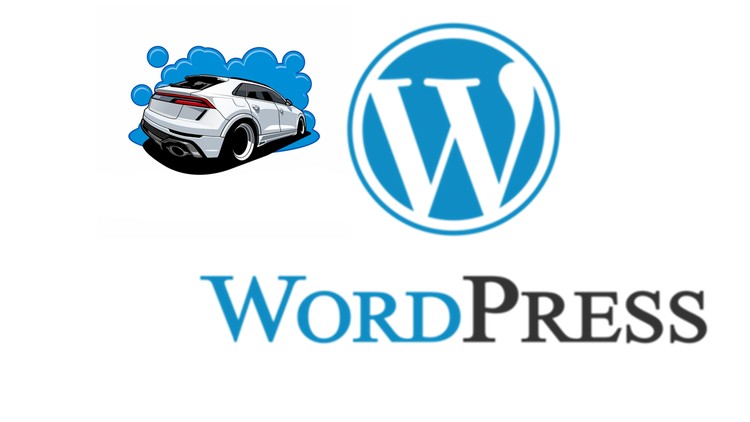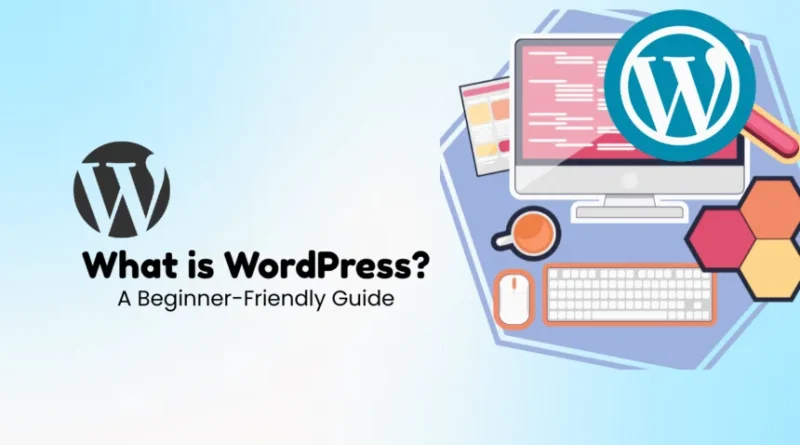Complete Beginner’s Guide to WordPress in 2025
In 2025, WordPress continues to dominate as the world’s most popular content management system (CMS), powering over 43% of all websites. Whether you’re a blogger, entrepreneur, small business owner, or a digital marketer, WordPress provides a flexible, user-friendly, and cost-effective solution to build websites without needing advanced coding skills.This comprehensive guide will walk you step by step through everything you need to know about WordPress in 2025 from installation and setup to themes, plugins, SEO, and security.By the end of this guide, you’ll have all the knowledge needed to create, manage, and grow your WordPress site successfully.
1. What is WordPress?
WordPress is an open-source content management system that allows users to create websites, blogs, and online stores with ease. It’s free to use and highly customizable.
1.1 WordPress.org vs. WordPress.com
-
WordPress.org (self-hosted): Free software, requires hosting and domain, full control over customization.
-
WordPress.com (hosted): Managed service with limited control, better for beginners who don’t want to deal with hosting.
For maximum flexibility, most professionals recommend WordPress.org.
2. Why Choose WordPress in 2025?
-
Free & Open Source – You only pay for hosting and domain.
-
Beginner-Friendly – No coding required for setup.
-
SEO-Friendly – Optimized for Google and other search engines.
-
Scalable – Suitable for blogs, portfolios, business sites, and eCommerce.
-
Community Support – Millions of users and developers.
-
Plugins & Themes – Thousands of free and premium options.
3. Setting Up WordPress Step-by-Step
3.1 Get a Domain Name
Choose a unique and brandable name, e.g., yourbusiness.com.
3.2 Choose Web Hosting
Recommended hosting providers in 2025:
-
Bluehost
-
SiteGround
-
Hostinger
-
WP Engine (premium)
3.3 Install WordPress
Most hosting providers now offer 1-click WordPress installation.
3.4 Access WordPress Dashboard
Login at: yourdomain.com/wp-admin
The dashboard is where you’ll manage content, design, plugins, and settings.
4. WordPress Dashboard Overview
-
Posts – Blog articles
-
Pages – Static content (About, Contact, Services)
-
Media – Images, videos, files
-
Appearance – Themes, menus, widgets
-
Plugins – Extend functionality
-
Users – Manage authors/admins
-
Settings – Site configuration
5. Choosing the Right Theme in 2025
Themes control your site’s look and feel.
5.1 Free Themes
Available in the WordPress theme directory. Examples: Astra, OceanWP, GeneratePress.
5.2 Premium Themes
Offer more features and customization. Examples: Divi, Avada, Neve Pro.
5.3 Things to Consider When Choosing a Theme
-
Mobile-friendly (responsive design)
-
Speed optimized
-
SEO-ready
-
Regularly updated
-
Compatible with popular plugins
6. Essential Plugins for WordPress in 2025
Plugins add functionality to your site. Here are must-have plugins:
-
SEO: Rank Math / Yoast SEO
-
Security: Wordfence / iThemes Security
-
Performance: WP Rocket / LiteSpeed Cache
-
Backups: UpdraftPlus
-
Analytics: MonsterInsights
-
Forms: WPForms / Contact Form 7
-
eCommerce: WooCommerce
-
Page Builders: Elementor / Beaver Builder
7. Customizing Your WordPress Site
-
Appearance > Customize – Adjust colors, fonts, layouts.
-
Menus – Create navigation menus.
-
Widgets – Add sidebars, footers, search bars.
-
Page Builders – Use drag-and-drop editors like Elementor.
8. Creating Content on WordPress
8.1 Adding Blog Posts
-
Use Gutenberg Block Editor
-
Add headings, images, videos, lists
-
Use categories and tags
8.2 Creating Pages
Examples: Home, About, Contact, Services, Blog
8.3 Optimizing for SEO
-
Use focus keywords
-
Add meta descriptions
-
Optimize images with alt text
-
Internal linking
9. WordPress and SEO in 2025
Search Engine Optimization is crucial for ranking on Google.
9.1 On-Page SEO
-
Keyword optimization
-
Mobile responsiveness
-
Fast loading speed
9.2 Off-Page SEO
-
Backlinks
-
Guest posting
-
Social sharing
9.3 Technical SEO
-
XML Sitemaps
-
SSL Certificate (HTTPS)
-
Schema Markup

10. Securing Your WordPress Site
Security is a major concern in 2025 with increasing cyber threats.
-
Use strong passwords
-
Install an SSL certificate
-
Limit login attempts
-
Regularly update plugins/themes
-
Enable two-factor authentication
-
Use backup plugins
11. WordPress for eCommerce
With WooCommerce, you can turn your WordPress site into a fully functional online store.
Features include:
-
Product pages
-
Shopping cart
-
Payment gateways (PayPal, Stripe)
-
Inventory management
-
Discounts & coupons
12. WordPress Performance Optimization
-
Use caching plugins
-
Optimize images (WebP format)
-
Use a Content Delivery Network (CDN)
-
Minimize CSS and JavaScript
-
Choose lightweight themes
13. WordPress Trends in 2025
-
AI-Powered SEO tools
-
Voice Search Optimization
-
Headless WordPress (for advanced developers)
-
AR/VR integration
-
Faster no-code solutions
14. Common WordPress Mistakes to Avoid
-
Installing too many plugins
-
Using nulled (pirated) themes/plugins
-
Ignoring updates
-
Not backing up your site
-
Poor hosting choice
15. Growing Your WordPress Website
-
Focus on high-quality content
-
Build backlinks
-
Use email marketing
-
Share posts on social media
-
Monitor performance using Google Analytics
Conclusion
WordPress in 2025 remains the most powerful and flexible website-building platform for beginners and experts alike. With the right hosting, theme, and plugins, you can build a blog, business website, or eCommerce store in just a few steps.By following this guide, you’ll avoid common pitfalls, optimize your site for SEO, and create a secure, scalable website ready to grow with your goals.Whether you’re starting your first blog or launching a digital business, WordPress is the ultimate tool to bring your vision online in 2025.
Frequently Asked Questions (FAQ)
1. What is WordPress?
WordPress is the world’s most popular Content Management System (CMS) that allows you to build and manage websites without advanced coding knowledge. It powers over 40% of all websites globally, from personal blogs to e-commerce stores.
2. Is WordPress still relevant in 2025?
Yes, WordPress is more relevant than ever in 2025. With constant updates, thousands of plugins, responsive themes, and AI-powered tools, it remains the go-to platform for beginners, businesses, and developers.
3. What’s the difference between WordPress.com and WordPress.org?
-
WordPress.com – A hosted solution, easier for beginners, but with limited flexibility unless you pay for premium plans.
-
WordPress.org – A self-hosted version, free to use, offering complete control over your website, themes, and plugins.
4. Do I need coding skills to use WordPress?
No. You don’t need coding skills to build a basic WordPress site. Drag-and-drop page builders like Elementor, Divi, or Gutenberg editor make it beginner-friendly. However, learning some HTML, CSS, or PHP can help you customize your site further.
5. How much does a WordPress website cost in 2025?
Costs depend on your needs:
-
Domain name: $10–$15/year
-
Web hosting: $3–$20/month (for basic shared hosting)
-
Premium themes/plugins: Optional, $30–$100 each
On average, a small site costs $50–$200 per year.
6. What is the best hosting for WordPress in 2025?
Some of the best hosting providers in 2025 include:
-
Bluehost – Beginner-friendly
-
SiteGround – Reliable with strong support
-
Hostinger – Budget-friendly with good speed
-
WP Engine – Premium managed hosting
7. Can I build an e-commerce store with WordPress?
Yes. With the WooCommerce plugin, WordPress can turn into a full e-commerce platform. You can sell products, manage inventory, accept payments, and more.
8. Is WordPress secure in 2025?
Yes, WordPress is secure if properly managed. To protect your site:
-
Keep themes/plugins updated
-
Use strong passwords
-
Install a security plugin like Wordfence or Sucuri
-
Enable SSL (HTTPS)
9. Can I monetize a WordPress website?
Yes, you can monetize your site through:
-
Google AdSense
-
Affiliate marketing
-
Sponsored posts
-
Selling digital products or services
10. What are the best plugins for beginners?
Some must-have WordPress plugins in 2025 include:
-
Yoast SEO / Rank Math – For SEO optimization
-
Elementor – For easy page building
-
WooCommerce – For online stores
-
WP Rocket / W3 Total Cache – For speed optimization
-
UpdraftPlus – For backups
11. How long does it take to learn WordPress?
Most beginners can learn the basics within a week. However, mastering customization, SEO, and advanced plugins may take a few months of practice.
12. Can I migrate my website to WordPress?
Yes, you can migrate from Wix, Squarespace, Blogger, or custom-coded sites to WordPress using migration plugins or professional services.




